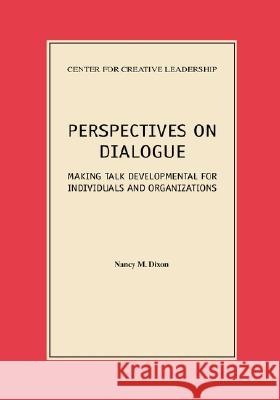Perspectives on Dialogue: Making Talk Developmental for Individuals and Organizations » książka
Perspectives on Dialogue: Making Talk Developmental for Individuals and Organizations
ISBN-13: 9781882197163 / Angielski / Miękka / 1996 / 60 str.
There is a growing sense today that organizations and the people that make them up are, to repeat a figure of speech recently used by Robert Kegan, in over their heads. As diversity becomes the rule and change the sole constant, complexity is increasing. It is generally agreed that the only effective response to this complexity is development: both at the individual and organizational level. One frequently practiced but imperfectly understood developmental activity is talk. This paper looks at the relationship between talk and development in organizations, noting the ways that developmental talk--or, as it is often referred to, dialogue--differs from the skilled talk that goes on all the time. It also summarizes five views on dialogue as offered by leading theorists, offers a series of practical observations based on these views, and presents some examples of how dialogue has been incorporated into the work processes of organizations.
There is a growing sense today that organizations and the people that make them up are, to repeat a figure of speech recently used by Robert Kegan, in over their heads. As diversity becomes the rule and change the sole constant, complexity is increasing. It is generally agreed that the only effective response to this complexity is development: both at the individual and organizational level. One frequently practiced but imperfectly understood developmental activity is talk.This paper looks at the relationship between talk and development in organizations, noting the ways that developmental talk--or, as it is often referred to, dialogue--differs from the skilled talk that goes on all the time. It also summarizes five views on dialogue as offered by leading theorists, offers a series of practical observations based on these views, and presents some examples of how dialogue has been incorporated into the work processes of organizations.











